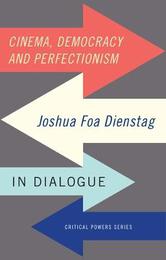
|
Cinema, Democracy and Perfectionism: Joshua Foa Dienstag in Dialogue
Paperback / softback
Main Details
| Title |
Cinema, Democracy and Perfectionism: Joshua Foa Dienstag in Dialogue
|
| Authors and Contributors |
Edited by Joshua Foa Dienstag
|
| Series | Critical Powers |
|---|
| Physical Properties |
| Format:Paperback / softback | | Pages:232 | | Dimensions(mm): Height 234,Width 156 |
|
| Category/Genre | Film theory and criticism
Ethics and moral philosophy
Social and political philosophy |
|---|
| ISBN/Barcode |
9781784994020
|
| Classifications | Dewey:172.1 |
|---|
| Audience | | Professional & Vocational | | Tertiary Education (US: College) | |
|---|
|
Publishing Details |
| Publisher |
Manchester University Press
|
| Imprint |
Manchester University Press
|
| Publication Date |
28 June 2016 |
| Publication Country |
United Kingdom
|
Description
In the lead essay for this volume, Joshua Foa Dienstag engages in a critical encounter with the work of Stanley Cavell on cinema, focusing skeptical attention on the claims made for the contribution of cinema to the ethical character of democratic life. In this debate, Dienstag mirrors the celebrated dialogue between Rousseau and Jean D'Alembert on theatre, casting Cavell as D'Alembert in his view that we can learn to become better citizens and better people by observing a staged representation of human life, with Dienstag arguing, with Rousseau, that this misunderstands the relationship between original and copy, even more so in the medium of film than in the medium of theatre. Dienstag's provocative and stylish essay is debated by an exceptional group of interlocutors comprising Clare Woodford, Tracy B. Strong, Margaret Kohn, Davide Panagia and Thomas Dumm. The volume closes with a robust response from Dienstag to his critics. -- .
Author Biography
Joshua Foa Dienstag is Professor of Political Science and Professor of Law at University of California Los Angeles -- .
Reviews"A learned, thoughtful, and very wide-ranging reflection on the aesthetics and ontology of film, the place and role of erotic desire in democratic life, the limitations of political optimism regarding that place and role, and the limitations of Stanley Cavell's account of that place and role." Andrew Norris, University of California, Santa Barbara -- .
|